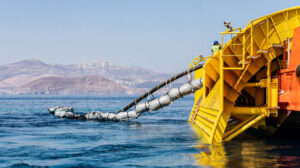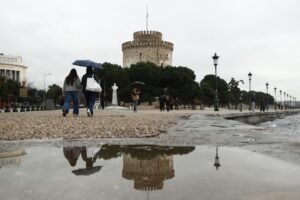Nicosia has today approved Cyprus’s participation in the Great Sea Interconnector (GSI) project with a cabinet decision that agrees to pay €25 million annually for 5 years, as proposed by ADMIE (Independent Power Transmission Operator), to make the Cyprus-Crete electrical interconnection project viable.
If the electrical interconnection is not completed by 2029, funding will be suspended and will resume once the project becomes operational.
During the first five years, Cypriot electricity consumers will not bear any direct costs, as the total €125 million will be drawn from the emissions trading system.
Additionally, if further funding is needed after 2029, it will be added to electricity bills.
Open Issues
However, the decision did not resolve all outstanding issues. One major unresolved issue is the sharing of geopolitical risk, with the proposal to split it 50-50 between Greece and Cyprus if the project is not completed due to reasons beyond ADMIE’s control. Initially, ADMIE proposed a 63% share for Cyprus and 37% for Greece, but Nicosia did not accept this. After negotiations, they agreed on a 50-50 split.
Another unresolved issue is the 8.3% return on investment for ADMIE for 17 years instead of 12, although an agreement has been reached. However, the Cypriot cabinet has yet to make a decision on this matter.
The Decision
Cyprus’s Energy Minister, George Papaconstantinou, announced the cabinet decision, stating:
“The Cabinet today approved the proposal from the Ministry of Energy, Commerce, and Industry regarding the Cyprus-Crete electrical interconnection. The project will help end Cyprus’s energy isolation by connecting the national electricity transmission system to the corresponding EU systems, thereby increasing our country’s energy security. Achieving this goal is crucial for maintaining and accelerating economic development and the well-being of our citizens, as the primary aim is to reduce electricity prices through the interconnection, the arrival of natural gas, and renewable energy sources.
The importance of the project for both Cyprus and the European Union is confirmed by the European Commission’s approval of funding from the Connecting Europe Facility (CEF) with the highest historically approved amount of €657 million.
The Cabinet approved the allocation of €25 million annually for 5 years, starting from January 1, 2025, as a subsidy to offset the potential increase in electricity bills during the construction period of the interconnection, from January 1, 2025, to December 31, 2029. This amount will be drawn from the Republic’s reserve fund and specifically from the emissions trading system. The first €25 million installment will be included in a supplementary budget.
The Cabinet’s decision is the culmination of extensive consultations with all involved parties and clarifications to ensure that the Republic of Cyprus has accurate data regarding the financial, technical, and legal aspects of the project.
As a Government, we have shown the necessary responsibility and diligence that should characterize decision-making for such large-scale projects, with the sole aim of serving the interests of the Cypriot people to whom we are accountable.
In the near future, based on the roadmap that has been established, we will be in constant communication with both the Greek side and the European Commission for further progress on the project, as well as with parties that have already shown real interest in participating in the project.”
The Geopolitical Risk
The initial concern for Nicosia in making the final decision was the geopolitical risk—who would bear the cost if the project fails due to Turkish interference and obstruction of the cable laying.
The ADMIE’s requirement for Cyprus to cover 63% of the damage and Greece 37% was added to the equation. ADMIE considered this distribution fair because the GSI primarily benefits Cyprus and less so Greece. Conversely, Nicosia saw this demand as a sign of Greece’s inability to guarantee the project’s completion. Despite statements from Prime Minister Kyriakos Mitsotakis and Foreign Minister Giorgos Gerapetritis that there was no issue of project non-implementation due to Turkish interference, this did not provide sufficient assurance. The fact that the project is of common interest and is largely funded by EU funds was also not deemed enough to resolve the issue. Today, however, Cypriot Energy Minister George Papaconstantinou highlighted this important aspect as a guarantee from the EU.
So far, Turkey has only expressed objections to the GSI’s utility without issuing threats. It has limited itself to offering to connect the free areas of Cyprus to the self-declared state, which would then connect to the Turkish network. This would mean Cyprus would be hostage to Turkey, as the self-declared state and Turkey could shut off the electricity supply at will.
Guarantees from Washington
The US, noting Nicosia’s hesitation or reluctance, intervened in recent days with statements from both their ambassador in Nicosia, Julie Fisher, and former ambassador to Athens and current Deputy Secretary of State for Energy, Geoffrey Pyatt.
They encouraged Cyprus to promptly agree to participate in the GSI, highlighting that it is a significant opportunity that should not be missed. Julie Fisher was particularly clear, stating, “Cyprus is in a vulnerable position. (…) and it is now time to look beyond the financial aspects (euros) of the Great Sea Interconnector project, considering the geopolitical context surrounding such a project and recognizing how important it is for Cyprus to connect with Europe through this opportunity.”
Even after these statements, which indicated that the geopolitical risk could not be a serious argument against reaching an agreement, Nicosia continued to have reservations. These reservations were somewhat alleviated, as reliable sources indicate there were also behind-the-scenes recommendations from the US to resolve the issue as quickly as possible.
Subsequently, there was a phone conversation between Israeli Energy Minister Eli Cohen and Cypriot counterpart George Papaconstantinou, emphasizing “the great importance of the Great Sea Interconnector project for Israel.” The project, the Israeli minister stated in a social media post, “will connect Israel’s electrical grid with Europe via Cyprus and Greece and will enhance regional energy security. This groundbreaking project is a top priority for Israel as it strengthens regional energy security, provides access to various energy markets, and enhances Israel’s integration into the European energy grid.”
The United Arab Emirates also expressed strong interest in the Cyprus-Greece interconnection during the recent lightning visit by Cypriot President Nicos Christodoulides. In fact, the UAE has expressed an intention to participate in the GSI’s equity capital, having signed a memorandum of understanding with the Cypriot Energy Regulatory Authority (RAEK) and ADMIE last December.
Yes, but… the Money is a Lot
During the ADMIE-RAEK negotiations, other issues arose, which were mostly resolved and primarily related to the burden on Cypriot consumers from participating in the GSI. Despite recognizing that the electrical interconnection primarily benefits Cyprus, there was hesitancy about paying €125 million to make the project viable. The negotiations centered on the timing of when Cypriot electricity bills would be affected. Nicosia insisted that consumers should start paying with the commencement of the GSI operation, not earlier. Ultimately, an agreement was reached to pay €25 million annually starting January 1, 2025, with the funds coming from the emissions trading market, as Cyprus continues to use fuel oil for electricity generation. The Cypriot side has also agreed to ADMIE’s requirement to extend the 8.3% return on investment from 12 to 17 years.
Another issue is the total cost of the project. Currently estimated at €1.9 billion, Nicosia is seeking assurances from ADMIE that costs will not escalate to levels that could impact the stability of the Cypriot economy.
The cost of constructing the cable by the French company Nexans is also significant. At the end of August, Nexans threatened to halt its operations if it did not receive an official order to proceed (Full Notice to Proceed). Nexans has blamed RAEK for delays. It seems some additional time has been secured to prevent the process from collapsing, as such a scenario would also mean losing €657 million from EU funds, since the EU has decided to finance the project, which is considered of common interest. These factors left Nicosia with little room for further delay.
Changing the Picture
The electrical interconnection will definitively end Cyprus’s energy isolation from the rest of Europe, as it is the only EU member country without a connection to the networks of its partners. In reality, Cyprus is at the mercy of Turkey, as in the event of an abnormal situation affecting electricity supply, the only option would be the self-declared state. In 2011, when a major power plant in the Vasilikos area was destroyed by an explosion of stored materials intended for the Assad regime in Syria, the Republic of Cyprus had to purchase electricity from the occupied territories.
According to military sources in Nicosia, in the unlikely event of hostilities with Turkey, the free areas of Cyprus could be plunged into darkness, as power generation units are priority targets in such cases. Even if this does not occur, a limited naval blockade would prevent the import of fuel oil, which is the only fuel used for electricity generation.
The interconnection with Israel and Greece, the same sources stated, creates a different dynamic as it involves other countries in protecting the electricity transmission pipeline. If the interconnection with another pipeline connecting Egypt with Greece and some Arab countries with Israel is also considered, it will not be easy for Turkey to act without considering the broader interests at stake, primarily those of the EU and the US.
Ask me anything
Explore related questions





